7 Hours a Night Can Lead to Weight Gain
- Dr Owais Rafiq
- September 28, 2023
- 8:50 pm

How Sleeping Less than 7 Hours a Night Can Lead to Weight Gain
The Sleep-Weight Connection
Ever notice how after a bad night’s sleep, you feel hungrier than usual? It’s not just your imagination. When you snooze less than 7 hours a night, you might be setting yourself up for weight gain. The surprising part? This connection is backed by science.

Hormonal Havoc: The Role of Leptin and Ghrelin
Think of leptin and ghrelin as your body’s personal cheerleaders for weight control. Leptin tells you when to stop eating, while ghrelin whispers that it’s time to eat. When you skimp on sleep, these two hormones can get out of balance. Lack of sleep boosts ghrelin levels and lowers leptin levels. In simple terms, you feel hungrier and less satisfied after eating. This hormonal chaos can easily lead to extra snacks and larger portion sizes, which are prime culprits for weight gain.
Metabolism on Pause: Sleep and Caloric Burn
Sleep isn’t just about resting; it’s also about recovery. When you’re in deep sleep, your body gets a chance to recharge and burn calories efficiently. Less sleep can slow down your metabolism. Imagine a car that’s running on low fuel—its performance isn’t optimal. Similarly, a tired body struggles to metabolize food properly, making it easier to pack on pounds.

Cravings for Junk Food: The Sleep-Deprived Diet Dilemma
After a night of tossing and turning, what do you crave? Often, it’s salty snacks or sugary treats, right? This is because sleep deprivation can trigger cravings for high-calorie foods. Your body’s natural response to fatigue is to seek quick energy sources. It’s like being in a finish line sprint; you want to grab whatever is closest, even if it’s not what you need.
Energy Levels: Impact on Physical Activity
Feeling sluggish after a poor night’s sleep? You’re not alone. Lack of sleep can sap your energy, making it harder to hit the gym or even take a brisk walk. When exercise takes a back seat, it also leads to fewer calories burned. Think of it like a phone battery—over time, if you don’t recharge it, it won’t perform well. The same goes for your body when it’s low on sleep.

Stress and Emotional Eating: A Two-Way Street
Sleep deprivation doesn’t just mess with your hormones; it can also make you more stressed. Stress often leads to emotional eating, where food becomes a coping mechanism. You might find yourself reaching for comfort foods instead of healthy options. This pattern creates a cycle of stress eating and weight gain, further complicating the issue.
Quality vs. Quantity: Not All Sleep is Created Equal
Here’s a twist: it’s not just about the number of hours you get. Quality matters too! Tossing and turning all night won’t help your weight loss goals. Deep, restorative sleep is what your body craves. It’s like looking for a treasure in a field—just sleeping isn’t enough; you’ve got to find the right spot for that gold!

Final Thoughts: The Path to Better Sleep for Better Health
To sum it up, sleep plays a pivotal role in managing weight. Fewer than 7 hours of rest each night can lead to imbalanced hormones, slowed metabolism, and increased cravings. If you want to keep that scale steady, prioritizing sleep is a must. So, the next time you think about skipping a few z’s for late-night activities, remember that your health—and your waistline—might pay the price. Sleep well, live well!

Dr Owais Rafiq
Subscribe to Dr Owais YouTube channel
For parenting advice, child health, symptoms, causes and treatment of illness in children.





